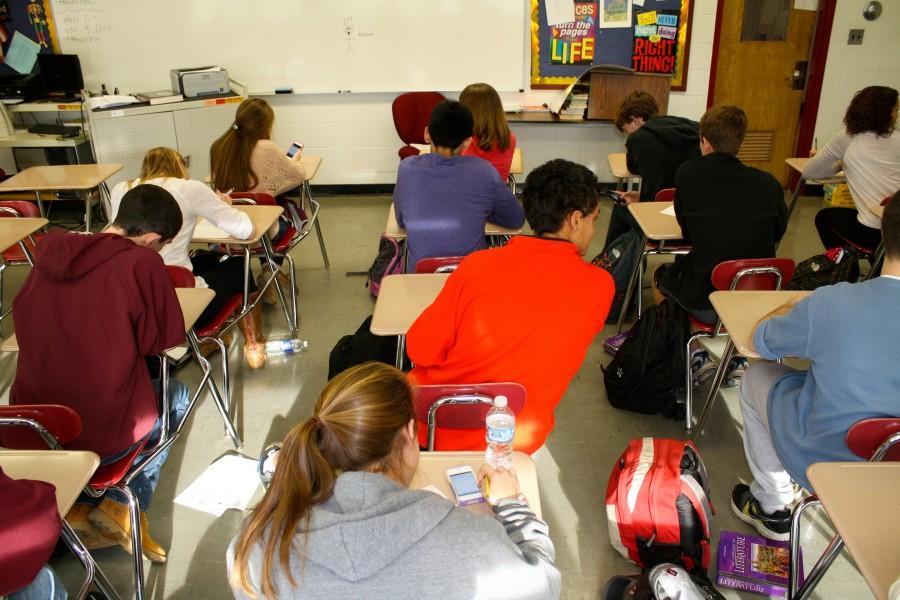One of the core values of the Madison school district is, “that integrity and trust are critical to achieving excellence.” Madison High School was recently ranked as the 6th best public school in the state. This ranking is based primarily on standardized test scores, the difficulty of courses offered, and the performance of the students who supposedly adhere to the principles of the district. With this high rank comes a pressure for MHS students to meet and maintain these high expectations. This pressure can lead to some questionable actions, namely breaking our code of integrity through cheating and academic dishonesty. This type of action is one that causes controversy at any level, whether it’s college or high school.
To begin, there needs to be an abstract definition of cheating. The literal word “cheat” comes from the Middle English verb “achete” meaning to steal or confiscate property or goods. Academic cheating is taking someone else’s knowledge with or without permission and using it for one’s own success.
Cheating can be classified into different types. There’s the classic cheating during tests, where the student leans over to peek at another’s paper or takes out a cheat sheet with information written on it. Then, there’s collaborative cheating, where students “share” their ideas with each other during either tests or when doing homework. Finally there’s the more elaborate type that has evolved as technology has advanced. It involves careful planning, taking notes on a cell phone, and even stealing or photographing the teacher’s test. With the amount of technology that students have access to, students are given countless new ways to cheat. Taking pictures of tests, sending text messages during assessments, or writing answers down in their phones are just some ways kids “cheat” the system.
So, is cheating a problem at Madison? According to surveys taken by the Madison Dodger Online, many teachers think that it is; 80% of the teachers polled agreed that cheating is a problem at MHS. However, Mr. Ellrott, an English teacher at the school made a good point, stating, “Cheating is a problem everywhere…as long as competition exists so will cheating.” It is obvious that kids will always cheat the system, but will teachers take action to suppress the issue? If cheating is prevalent everywhere, then what defines a true cheating problem?
Cheating tends to cause more controversy when it occurs in higher-level classes. The reason for this is that class ranking is affected, and students at the top of the class are expected to have the utmost academic integrity of all the students in the school. Many teachers at MHS believe that cheating occurs equally throughout different class levels with a slight leaning towards enriched. However the student data collected by the Madison Dodger Online strongly opposed that of the teachers. Sixty percent of the students that were polled said that honors students are more likely to cheat. Which set of data more accurately depicts what goes on behind the scenes during tests? Who is closer to the truth: the students or the teachers?
It is obvious that teachers disapprove of cheating, but do teachers take it personally when they discover that students cheat their way through class? A few said that is makes them feel less respect towards students; others said it is solely disrespectful towards other students, and many agreed that it shows a lack of respect for the teacher. But how far do teachers go to stop academic dishonesty? Some teachers always make tests for separate periods, some do so occasionally, and some use the same test for every class period. One teacher who uses the same tests for all classes said, “I respect my students’ integrity.” Another teacher however has little faith in students being honest, “My tests are all designed to discourage cheating.” However, the student opinion sometimes largely negates this misplaced trust.
The students’ opinion varies quite a bit from the teachers’. In a startling admission, 50% of students say grade quality is more important than academic integrity. “Grades don’t reflect learning,” explained one student. A more shocking poll shows that 50% of students agree that a dishonest B- is a better grade than an honest C+. One brave student who clearly believes in honesty stated, “An attempt is far more valuable than a correct answer.” However, it is clear that many students could care less about the morals behind cheating, as long as they receive a grade they’re happy with.
Does cheating make a person a “fraud”? Some students cheat to pass a class, while some cheat to get into the school of their dreams, and others cheat out of pure laziness. Everyone has his or her own opinion about what “academic dishonesty” means, or what it says about a person. There is no clear line on what is acceptable or not, but it is up to every student to make their own decision not only during high school, but also throughout life. According to the students here at Madison, integrity is not a facet of a successful life. Student data clearly illustrates how our mission and core values, “integrity” and “trust,” may not be so accurate as we would think.
http://njmonthly.com/articles/towns_and_schools/2012-top-high-schools-methodology.html
